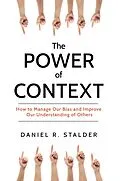A social psychologist focuses on a very common yet rarely discussed bias called the "fundamental attribution error," showing how being aware of this bias can improve our day-to-day understanding of others. Social life involves making judgments about other people. Often these snap judgments turn out to be wrong when we overlook context. Social psychologists call this pervasive bias the "fundamental attribution error." This book explores the many ways in which this error creeps into our social interactions, frequently causing misunderstanding, hurt feelings, and negative treatment of others. Psychologist Daniel R. Stalder examines common examples of this error, from road rage and misinterpreting facial expressions to "gaydar," victim blaming, and prejudice. The common denominator in these diverse examples is that we falsely assume inherent traits or intentions while overlooking situational factors that might explain a person's behavior. Conversely in the actor-observer bias, we explain our own sometimes questionable behaviors by appealing to situational factors. For example, when you tailgate others, there's always a good reason, but when others tailgate you, they are obviously in the wrong. Stalder also reveals little-known information about classic studies of context, considers both the upsides and downsides to bias, and shares numerous strategies to reduce bias. Filled with interesting examples, new insights, and an abundance of research, this informative and entertaining book will help us understand each other and reduce conflict.
Autorentext
Clemantine Wamariya is a storyteller, public speaker, social entrepreneur, and human rights advocate. Born in Kigali, Rwanda, displaced by conflict, Clemantine migrated throughout seven African countries as a child. At age twelve, she was granted asylum in the United States and went on to receive a BA in Comparative Literature from Yale University. Clemantine now uses stories drawn from her experiences to catalyze change and create community. She lives in San Francisco.
Elizabeth Weil is a contributing writer to the New York Times Magazine. She lives in San Francisco with her husband and two daughters.
Zusammenfassung
A riveting story of dislocation, survival, and the power of the imagination to save us
Clemantine Wamariya was six years old when her mother and father began to speak in whispers, when neighbors began to disappear, and when she heard the loud, ugly sounds her brother said were "thunder." It was 1994, and in 100 days more than 800,000 people would be murdered in Rwanda and millions more displaced. Clemantine and her fifteen-year-old sister, Claire, ran and spent the next six years wandering through seven African countries searching for safety—hiding under beds, foraging for food, surviving and fleeing refugee camps, finding unexpected kindness, witnessing unimaginable cruelty. They did not know whether their parents were alive.
At age twelve, Clemantine, along with Claire, was granted asylum in the United States--a chance to build a new life. Chicago was disorienting, filled with neon lights, antiseptic smells, endless concrete. Clemantine spoke five languages but almost no English, and had barely gone to school. Many people wanted to help—a family in the North Shore suburbs invited Clemantine to live with them as their daughter. Others saw her only as broken. They thought she needed, and wanted, to be saved. Meanwhile Claire, who had for so long protected and provided for Clemantine, found herself on a very different path, cleaning hotel rooms to support her three children.
Raw, urgent, yet disarmingly beautiful, The Girl Who Smiled Beads captures the true costs and aftershocks of war: what is forever lost, what can be repaired, the fragility and importance of memory, the faith that one can learn, again, to love oneself, even with deep scars.
